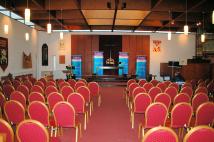 |
Glencairn Methodist Church |
 |
 |
Glencairn Methodist Church |
 |
| Home Page |
March 2007
"Success" is one of the gods of today's world. You are nothing if you are not successful. The measure of success of the national soccer team or rugby team is to win the World Cup. The athlete is only successful if they win an Olympic gold medal. The tennis player or golfer is only successful if they win a grand slam event. The chief executive of a business is only successful if his company's profits increase year on year. A family is only successful if they not only "keep up with the Jones" but outstrip them in the possessions they have and the foreign holidays they go on each year.
And what of a local church? What are the measures of success for them? A growing membership? Income exceeds expenditure every year? Money in the bank? Expanding membership? More conversions than ever before? Being lauded by all for their "success"?
As part of my Lenten discipline, I have been reading two books - The Road to Emmaus by Helen Julian CSF, and Powers, Weaknesses, and the Tabernacling of God by Marva J Dawn. Marva Dawn includes all of these measures of success among the Powers of her title, the powers St Paul writes about in Ephesians 6: 12 - "For our struggle is not against flesh and blood, but against ...the powers of this dark world...". The Powers are essential neutral, but if the church seeks after them as measures of success, then we fall into the sin of idolatry, worshipping the false god "success".
Marva Dawn reminds us that the only measure of success that can be applied to a church is whether or not it is faithful to God and focuses exclusively on God. The church's calling is to worship God and to obey him, by following him wherever he leads us to minister and to evangelise in his name. By concentrating on these, then we leave room for the Holy Spirit to convince people of their need for God, their need for repentance and forgiveness, their need for fellowship with him and his body, the church. Then indeed we may see growth in membership and the other measures of success. Or we may not if people do not respond. The outcome is in God's hands, and the concern of the church is simply to be faithful.
Helen Julian's book is intended to be read, a little at a time, day by day through Lent. Today I have completed the readings for the current week, in which Helen Julian has drawn inspiration from the life and work of the Venerable Bede, a monk who lived from about 673AD to about 735AD. Bede lived for most of his life in his monastery, teaching and writing, studying the scriptures and praying. He is considered to be the first historian of the English church.
Bede was faithful to God in his daily worship. Perhaps you could pray this prayer written by him: "I pray to you, good Jesus, as you have graciously granted to me sweet draughts of the Word which tells of you, so you will of your goodness grant that I may come at length to you, the fount of all goodness, and stand before your face for ever." Ken (3 March 2007)
NOTE - Previous "Monthly Messages" are archived at http://glencairn.connor.anglican.org/previousmessages.htm
|